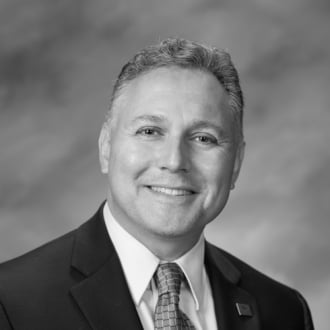You have /5 articles left.
Sign up for a free account or log in.

Daniel Silber resigned as provost of Piedmont University on Tuesday, suddenly and with a list of grievances about proposed budget cuts.
Photo by Matt Kodrowski/Courtesy of The Roar
Piedmont University provost Daniel Silber resigned abruptly on Tuesday in protest of proposed budget cuts and faculty layoffs, which the Board of Trustees was set to vote on this week.
In a highly critical email to colleagues announcing his departure, Silber wrote that the proposed budget cuts—which would be the second round this year—were “morally wrong" and that the budget process “failed to be properly inclusive.” He also argued that notifying faculty that they were being let go after the end of the academic year didn’t give them enough time to find new employment for next semester.
“I refuse to be a party to terminations that are carried out in such an unethical manner,” wrote Silber, who also served as senior vice president for academic affairs. “Now that this draconian measure is being implemented, I have no moral choice but to leave the institution.”
Representatives from the university in Demorest, Ga., declined to comment for this article.
Steve Nimmo, dean of the school of arts and sciences, will take over as vice president for academic affairs on an interim basis. Piedmont has yet to name an acting provost.
Silber’s resignation comes just a month after the Piedmont Faculty Senate issued a vote of no confidence in university president James Mellichamp, in part over “mismanagement” of the school’s finances and a lack of budgetary transparency, according to the faculty resolution. The Board of Trustees dismissed the faculty call for Mellichamp’s resignation, expressing “complete confidence” in the president.
Piedmont cut 8 percent of its faculty in February and has yet to give any of its current faculty contracts for next academic year.
‘Very Surprising,’ but ‘Not Unexpected’
 Dale Van Cantfort, a communications professor and the chair of Piedmont’s Faculty Senate, said he was “very surprised” by Silber’s resignation. He’d met with the former provost just 48 hours before his resignation and had no idea he was considering leaving.
Dale Van Cantfort, a communications professor and the chair of Piedmont’s Faculty Senate, said he was “very surprised” by Silber’s resignation. He’d met with the former provost just 48 hours before his resignation and had no idea he was considering leaving.
But while the abrupt nature of the resignation took him aback, Cantfort said he agreed with many of the frustrations Silber voiced in his email.
After a meeting to discuss the initial round of budget cuts in February, Cantfort said, administrators promised there would be no more faculty reductions. But in April, the Board of Trustees rejected the budget that Mellichamp submitted for the coming academic year. Mellichamp announced that further cuts would have to be made—including 15 additional faculty positions.
“We are approximately two months away from the fall semester,” he said. “Telling a longtime faculty member, ‘You don’t have a job’ and leaving them with no hope of finding one for next year because everybody has already filled their positions, I think that is not morally defensible.”
Cantfort said that through negotiations with senior administrators, he and other faculty members managed to reduce the number of positions to be cut in the proposed budget submitted to the board Thursday from 15 to four. The board has not yet voted on that budget.
Brian Mitchell, a former president of Bucknell University and co-founder of Academic Innovators, a higher education solutions company, said that while provosts often part ways with their institutions over disagreements, the suddenness of Silber’s departure, as well as the grievance-filled email that accompanied it, is extremely rare—and could do even more damage to the institution.
“If you’re trying to protect the institution, you need to ask, what impact does this have, for example, on deposits or enrollment?” Mitchell said. “If I were faculty, I would certainly applaud it, but within the broader context of the world in which we live, it probably didn’t help Piedmont at all to be presented in this way.”
‘Mismanagement’ and Poor Communication
In an email to faculty and staff on June 8, Mellichamp pushed back on the picture Silber painted in his resignation email, pinning the university’s budget shortfall on external circumstances.
“Our budget has been impacted by the pandemic, declines in graduate enrollment, volatility in the stock market, and overall economic uncertainty weighing on prospective students and their families,” he wrote. “Under these conditions, we have had to make difficult decisions as we chart the institution’s path through the pandemic and beyond.”
But Cantfort said Mellichamp’s justifications are only a small part of the story behind Piedmont’s financial troubles, which he said stem from mismanagement by administrators and the board.
“This is not because of the pandemic,” Cantfort said. “The finances of the school have not been handled properly for the past three years. Because of that, we find ourselves in a difficult financial situation, and the administration wants to balance that budget by eliminating faculty positions.”
In their no-confidence resolution, the Piedmont faculty cite unforced budgetary errors and expanded “real estate ventures” as reasons for the budget shortfall.
According to the resolution, Mellichamp and other senior administration knew about the university’s “dire financial situation” for many months before faculty were made aware. Cantfort said this lack of communication is part of the problem that led to both the no-confidence vote and Silber’s resignation, and that the continued uncertainty has led remaining faculty members to consider looking for other work pre-emptively.
“I’ve got a number of faculty members who tell me they are actively searching, because they don’t want to be left in the lurch,” Cantfort said. “It is not good news for the university that we’re in this situation … Every day that this drags on there’s the potential we lose good faculty members.”
Mitchell said the saga at Piedmont—from the initial budget cuts to the vote of no confidence to Silber’s resignation—points to a failure of communication among the Board of Trustees, the senior administration and the faculty.
“The real story here is about shared governance,” Mitchell said. “For a college or university to succeed, there has to be a synergy among the three groups, there has to be transparency and there has to be a willingness to engage in a dialogue that doesn’t turn public and ugly. And it looks like Piedmont failed on all those counts.”
Barbara Gitenstein, senior vice president of the Association of Governing Boards and a former president of the College of New Jersey, said that as the liaison between the Board of Trustees and the university’s internal constituents, senior administrators are responsible for informing stakeholders about financial issues early and having conversations with those whom budget cuts would affect.
“In any situation where you have to share unhappy news, earlier and more open conversations are always better and lead to healthier results,” she said.
‘Tough Times’ Ahead
In his resignation email, Silber offered a prediction for Piedmont’s future. He did not mince words.
“My hope is that there will be a last-minute change to change course, but, regardless, Piedmont University is in for some very tough times,” he wrote.
Cantfort is a little more optimistic, but he says major changes are necessary to make sure Piedmont’s business and educational models are sustainable.
“Piedmont University is a very solid university with instruction and education as our principal mission,” he said. “I believe it will survive this … but we feel changes still need to be made in order for Piedmont to build a better university.”
Mitchell said that as institutions face growing financial hurdles, tensions are likely to increase between faculty and administrators, and provosts will only face more pressure serving as liaison between the two parties. In that case, he said, the sudden nature of Silber’s departure, while uncommon now, may not be for long.
“The tuition revenue model upon which all less well-endowed schools depend is teetering right now, on the brink of collapse,” Mitchell said. “We’re likely to see increased pressure on higher education leadership, and it’s entirely possible that we’ll see more examples of this down the road.”





